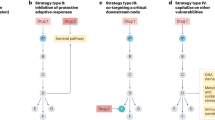Abstract
The purpose of our study was to investigate the efficacy and toxicity of paclitaxel in patients with relapsed or refractory epithelial ovarian cancer in the context of a large multicentre study performed in the UK and Eire. Patients with previously treated epithelial carcinoma of the ovary or fallopian tube who fulfilled the eligibility criteria were entered in the study. Eligibility criteria included: measurable or evaluable disease; Eastern Cooperative Oncology Group (ECOG) performance status 0-2; up to three prior chemotherapy regimens, one of which had to contain a platinum agent; adequate haematological, renal and hepatic function; and no significant cardiac history. Patients received either 175 mg m-2 or 135 mg m-2 paclitaxel. The lower dose was administered to patients who had received more than two prior chemotherapy regimens. Paclitaxel was given by i.v. infusion over 3 h every 21 days. Response was assessed at three-cycle intervals or earlier if required. A total of 155 patients were registered for the study in the UK of whom 140 were eligible for response and toxicity evaluation, and 12 patients were assessed for toxicity only. Hair loss was the most frequently reported toxicity, with 74% (119/152) of patients reporting grade 3 alopecia. The most frequently reported serious toxicity was neutropenia, with 49% (74/152) of patients experiencing neutropenia grade 3 or 4. The response rate was 16% [two complete responders (CR), 20 partial responders (PR)], the median duration of response was 275 days and median survival was 244 days. Paclitaxel is active in relapsed and platinum-resistant epithelial ovarian cancer. It is well tolerated and can be given in an out-patient setting. The UK and Eire experience is very similar to that of US investigators in this group of patients. Further work is required to assess the optimal use of the drug in both first- and second-line therapy.
This is a preview of subscription content, access via your institution
Access options
Subscribe to this journal
Receive 24 print issues and online access
$259.00 per year
only $10.79 per issue
Buy this article
- Purchase on Springer Link
- Instant access to full article PDF
Prices may be subject to local taxes which are calculated during checkout
Similar content being viewed by others
Author information
Authors and Affiliations
Rights and permissions
About this article
Cite this article
Gore, M., Levy, V., Rustin, G. et al. Paclitaxel (Taxol) in relapsed and refractory ovarian cancer: the UK and Eire experience. Br J Cancer 72, 1016–1019 (1995). https://doi.org/10.1038/bjc.1995.453
Issue Date:
DOI: https://doi.org/10.1038/bjc.1995.453
This article is cited by
-
Insights into ovarian cancer: chemo-diversity, dose depended toxicities and survival responses
Medical Oncology (2023)
-
Medikamentöse Therapie des Ovarialkarzinoms in der Primär- und Rezidivsituation
Der Onkologe (2019)
-
Randomised controlled trial comparing single agent paclitaxel vs epidoxorubicin plus paclitaxel in patients with advanced ovarian cancer in early progression after platinum-based chemotherapy: an Italian Collaborative Study from the ‘Mario Negri’ Institute, Milan, G.O.N.O. (Gruppo Oncologico Nord Ovest) group and I.O.R. (Istituto Oncologico Romagnolo) group
British Journal of Cancer (2004)
-
Outcome of ATP-based tumor chemosensitivity assay directed chemotherapy in heavily pre-treated recurrent ovarian carcinoma
BMC Cancer (2003)


